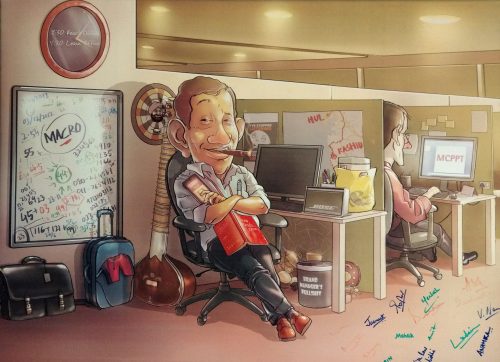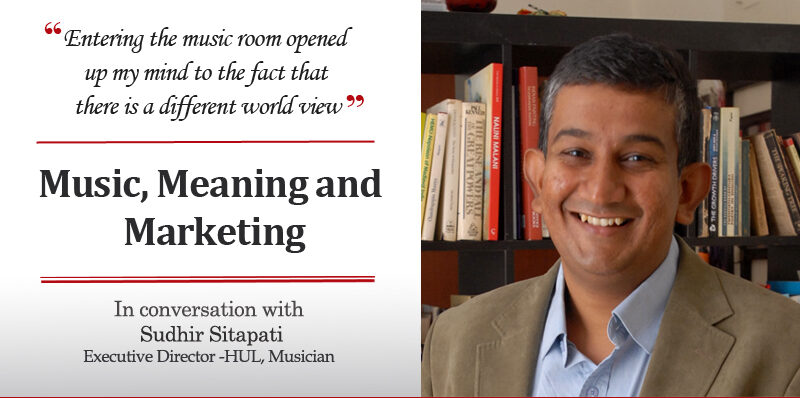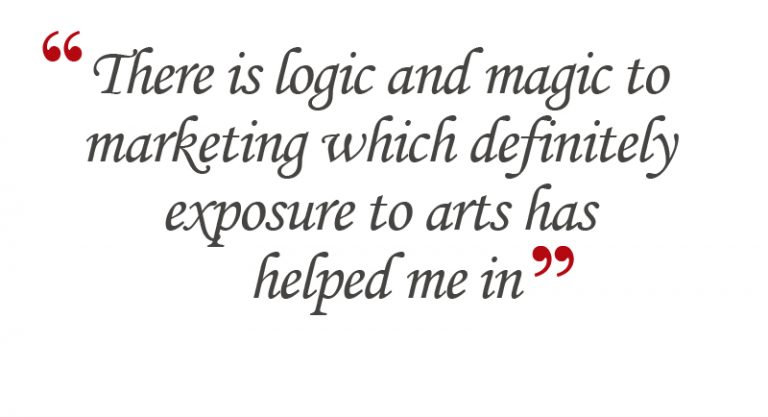Music, Meaning and Marketing
TAQ in conversation with Sudhir Sitapati – Executive Director Food and Refreshments at Hindustan Unilever Limited, musician and music aficionado
At TAQ we are curious about the impact of immersion in the arts on people – how it changes their perspective, what it contributes to how they live and work. At the confluence of experience and analysis, we met with Sudhir Sitapati, Executive Director at Hindustan Unilever Limited, to ask what it meant to have a view into two different worlds. Sudhir has been with HUL for the past two decades and is a much respected name in the marketing domain. In 2016, Sudhir featured in the Economic Times 40 under 40 most impactful business leaders and in the following year was awarded the Young Achiever’s Award from his alma mater – IIM Ahmedabad. Although well known for his creative marketing campaigns, most people may not know of his parallel journey in music. He plays the sitar and has been a disciple of the maestro Ustad Abdul Halim Jaffer Khan since the start of his career. In this conversation, we get a glimpse into what it is like to bring the whole brain to work, the tensions at play in inhabiting two worlds, and what it means to continue practicing music.
Here are excerpts from the interview:
On finding perspective
I started learning music after I graduated from IIM-Ahmedabad at the age of 22. I had the option of joining Unilever either in May or in July that year, so I chose July and during the two-month leave, started training in Sitar with Padmabhushan Ustad Abdul Halim Jaffer Khan. He was a sitarist of great renown and had a flourishing career in the 50s, 60s and 70s. His career stopped after he went deaf, but he continued to teach and was an incredible mentor. Learning with him had a powerful impact on me.
Fresh out of management school, I was quite left-brained in my approach. We left brained people rationalize, look for logic in everything. When I first came into music, I tried to make everything left brained, and my Guruji, he realized that. He said, “Sudhir, you have to bring rhythm in your life. First listen to the rhythm in your body and forget about your mind for some time”. I would go with him for walks and we would go see bhaji-pav being made outside and he would say, “Kaise tal raha hai dekho. Talne ki awaz suno” (Look at how the fritters are frying in the oil. Listen to the sound of the frying).
Entering the music room opened my mind up to the fact that there is a different world view. You see people who believe that the world exists in thought and there are other people who believe that the world exists in feeling or experience. Having a foot in either door makes you realize that there are two worlds operating. From understanding things in a mathematical sense, I was exposed to a different world and it has acted as a catalyst. It gave me a window into many other arts as well.
I don’t think I learned music as much as I learned an appreciation for responding to stimulus with feeling. During my stint in the UK, I stayed close to the Victoria and Albert museum which I enjoyed visiting. I developed a relationship afterwards with architecture – I put a lot of thought into the house that I built for myself inspired by the South Indian aesthetic. I really enjoy seeing good art or watching good films. I travel so much and wherever I go I enjoy immersing myself in that place and what it offers. Like swimming in the Narmada when I went to Maheshwar or how I made it a point to visit a fish market in Bangladesh. A couple of months ago, I had gone to Pakistan. On the way from Lahore to Multan, was Harappa – so I took some time out and explored that place. But it was all triggered by my relationship with my sitar Guruji – this need to spend time immersing in the beauty of life.
In my business, a lot of value is created through innovation. And this is where the feeling aspect has helped. Ordinary people relate to feeling. Only with training, we lose that. When my young team members see an advertising stimulus, they give you very logical structured answers. But the important question to ask is how you feel about a creative stimulus. I tell the brand managers that when someone presents an advertising script to you, you have got to look at your body and see whether you feel any sensation change. How does the script affect you? You can’t respond from the mind. You have to respond from the heart and soul and that is a skill I was lucky to learn with my Guruji.
Music has made be a better marketing person because the best marketers really sit at the middle of right brain and left brain. You have to know what the business size is, you have to analyse, you have to price correctly, but at the same time you have got to create a magic in the brand.
And it works the other way too. The creative projects I have been involved in I have been able to bring some structure and problem definition to because of the balance of thinking and feeling. So there is logic and magic to marketing which definitely exposure to arts has helped me in.
On finding purpose
You know, there was a brief period very early in my career when I thought that I should quit and pursue music full-time. I had even put in my papers. But there was a senior HR person – Prem Kamath – who encouraged me to complete my management training and then decide. It was during that stint that I realized I happened to be really good at what I was doing. I was a good marketing person and I knew that I had the ability to create big brands. I enjoyed myself so much at work. It was a good sort of lesson for me. When you start your career selling soap in Madhya Pradesh, a lot of your friends may not think it to be cool because they are sitting in fancy offices in Bombay or other big cities. But you have to find your sweet spot. If you are enjoying something and you are good at it, you might as well continue with it! Each of us have to find our mojo and it cannot be driven by what people think of us.
When it came to music, I asked myself whether I was just getting fixed with the idea of being a musician or was it something I was exceptionally talented in and also exceptionally enjoyed. The truth was that I enjoyed being with Guruji, and though I also enjoy music, it was not the thing I was most talented at.
If you can find the thing that you enjoy and can do really well, you can pretty much do anything in the world. Once you find that sweet spot, you stay the course with the ups and downs and land up at a place where you are reasonably happy.
On inhabiting two worlds
It definitely gives me a vantage point but also tears me apart. In the sense, if you are only on one side of the fence, you don’t get torn apart. But having a foot in logic and a foot in magic or in other words one half of your mind in reasoning and the other in the arts, I am acutely conscious of the fact that I have to pull myself away from one or the other. Sometimes there is a little bit of guilt, there is a little bit of frustration that you are not able to move yourself out of the world of thought into what you know is possible especially when you know that high that you can get with it.
But I enjoy the world of thought, I enjoy the world of business, I enjoy brands, I enjoy growth. Maybe family responsibilities also play at the back of my mind. But I think the bigger thing is on the one hand I enjoy this and on the other hand I enjoy that and therefore you are torn between the two worlds. So there is a constant tension. There are pros to having a foot in both worlds, but this is the con of it for me.
On being a leader
What would you say are some of your contributions as a leader?
I don’t know what contributions I am known for I can tell you the things that I am quite happy within all the years that I have spent with Unilever:
One – there are pieces of advertising or brand that I have worked really closely on which have lasted for many years. Surf Excel – ‘Daag Acche Hain” has become quite a well-known tagline and I have been part of the very early stages of that campaign. Then I also worked closely on Brooke Bond. Recently we have been doing a lot of work on Brooke Bond and togetherness. These are two brands that I have sort of shaped. I think we have created really powerful ideas that have lasted time with ‘Daag Acche Hain’ and ‘Swaad Apne Pan Ka’, that’s one thing I am quite proud of.
Two – I am quite proud of the legacy that I have left with some businesses that I worked on The soaps business I was handling we did a good job, our ice-creams business that wasn’t doing well for many years and it is turned around, and most recently the acquisition of Glaxo-Smithkline which is probably one of the largest acquisitions in the consumer goods industry.
Three – I have managed to stay in close touch with some of the teams I have worked with. That also gives me a lot of happiness. I used to be an area sales manager in Madhya Pradesh 20 years ago and we still have a close knit group of people who meet once in a year or so for the last 20 years though many of them are all over the world and some of them even retired. You can always get cynical when in a corporate world where all relationships are transactional. But when you have examples from your past where relationships last then you see that is also something important.
So I guess the brands that I have shaped, the businesses that I have built and the relationships that have stayed have made me happy.
What kind of a leader are you for your team? What would they say about you?

Actually that painting gives you a good idea of what they would say about me!
It is broadly been the same feedback, and the good thing is they feel comfortable telling me this. Here is what they think of me:
They think I am arrogant – see the expression in the picture. They think I drive them really hard, which is captured in all the numbers you see on the whiteboard behind me. They think I am very focussed and prioritized. I come to work early and leave early. In twenty years I have rarely left office after 5:30. They think I am content driven and not external rewards driven as you can see by the cobwebs on the trophies under my desk in the picture. They will say that he is both analytical and intuitive. They think I am eccentric and weird. My bag always has my swimming costume – for which they make fun of me.
So broadly, they would say that he is arrogant, he doesn’t listen, slightly full of himself, but he is fair and when the chips are down he is kind. And they will say this to me to my face also.
What would your bosses say about you?
My bosses generally like me. I tend to be straight talking but reasonable. And they would say the same things about quality of mind. They would not talk so much about the arrogance probably, but they would say this man only focuses on things he is interested in. This is feedback I get a lot from bosses – that I switch off in meetings where things are not of interest to me. They will definitely talk about my attention span.
What are some of your insights on successful leadership?
I have come to the conclusion that there is no one style of leadership. There are only two things that people do not like in a leader. One is maliciousness which comes from insecurity. As Machiavelli says, you can be irritated, exasperated, anything you want, but not malicious. If your subordinates are better than you, talk about it, celebrate it and be proud of it. If you don’t get personal or malicious, people don’t care whether you give them feedback in polite terms or just straight out. If people are rubbish at something, I just tell them, and they are ok with it. A lot of people tell me they prefer this straight talk.
The other thing a leader cannot be is unfair. A lot of hard decisions have to be made in order to be fair. For example, I had to promote people whom I intensely dislike and I say I will promote them because they deserve it. On the other hand, I have had to ask people to leave the organization, even though I shared a friendship with them. You have got to be seen as fair.
Other than this, people don’t really mind what kind of a leader you are.
On stillness and the continued practice of music
I continue learning with Guruji’s son once a week for an hour and a half. I find I am now able to do more creative things on the instrument. Though for an instrument like sitar you need to work much harder than I am working on it now. I do perform a little bit here and there, but that is not the main purpose of my music. My weekly class is akin to an hour and half of meditation every week. I am not trying to achieve anything except for my own self.
But I listen to music a lot and I find that it is important to immerse yourself in the musical experience, especially Indian classical music. If my mind is scattered and I am thinking of something else, any music playing at that time is like noise. There is something about particular ragas and the time of day or the time of the year. Nowadays, (in the monsoon), I listen a lot to Malhar for example. You have to create an atmosphere and some solitude to immerse in music.
One of the interesting things I have done is take this experience into the ads I have created and the way a brand is reinvented. The brand Taj in the 80’s was with Zakir Hussain where a musician enjoys the tea and says “Wah Taj!” This present ad really embodies my own relationship with music. Here we have an idea of music and solitude. We found that Indian women usually feel very guilty about taking time off, creating me-time, and the only moment for self-indulgence in their day was the 11 O’Clock cup of tea. The idea of savouring that is brought out in the tag line “Din ki ek cup chai, khud ke saath ho jaye – Wah Taj!”
It is difficult to balance this immersion with being in the real world. But what my Guruji taught me is the story of the drop of water on the lotus leaf. The drop of water enjoys the lotus leaf, but yet slips off with a light touch. I am talking more of it than what I actually practice, but I would like to be like that drop of water in the balance I bring between the real and the sublime.

